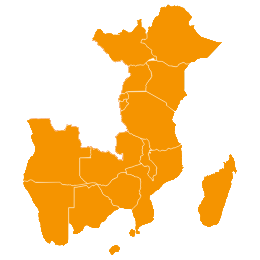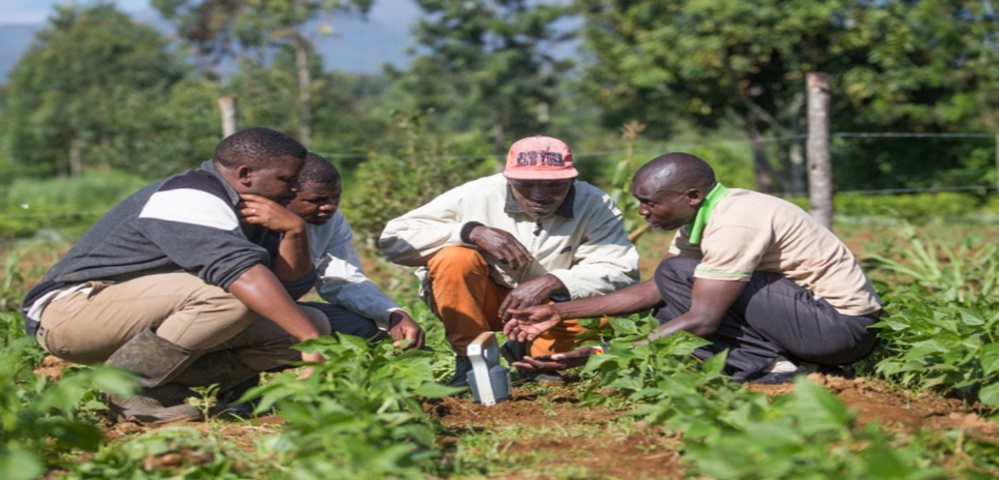Innovative soil scanner
One of the key advantages of this method is the speed of the soil analysis. The farmer can ask all the questions he or she has regarding the report and the fertilizer recommendations, and the interaction is immediate.
Chris Mangoli, Chief Officer Agriculture at Bungoma County, KenyaBACKGROUND
Many farmers lack on-site information and base their fertilizer selection on intuition or advice from local agro-dealers, without knowing the actual nutrient status of their soils. This results in a mismatch between applied and required nutrients, leading to yield stagnation and environmental degradation.
WHAT’S INVOLVED
Background knowledge: The AgroCares Soil Scanner is a handheld device that can be used by farmers, including those with no prior experience in nutrient testing. It provides quick on-site access to key soil nutrients and as well as advice on soil fertility management.
Practical solutions : The soil report is directly generated in the plot on a connected smartphone within ten minutes.
EXPLORE THIS SOLUTION
The report indicates:
- The level of total nitrogen (N), total phosphorus (P), exchangeable potassium (K) and organic carbon in the soil, as well as the soil’s pH level. These parameters are classified under one of three ranges: low, adequate, high.
- Crop-specific fertilizer recommendations; and
- a The suitable crop types for the scanned soil.

Countries involved
Kenya
Project partners
AgroCares, Solidaridad, Kenya Market Trust, Deutsche Gesellschaft für Internationale Zusammenarbeit (GIZ), Digifarm, research institutes (KALRO, SRI), Kenya County Governments (Nyeri, Uasin Gishu, Bungoma), Chuka University, Agri Vijana, Meru Coffee Union.
Project dates
2016 to today
Share this solution
Bookmark this solution
BookmarkShow Full Solution
Summary
By measuring levels of major nutrients like nitrogen, sodium and potassium, soil analysis allows farmers to gauge the appropriateness of growing a particular crop and adjust fertilizer use accordingly. However, because soil-scanning technology is costly and difficult to use, it is not widespread in Africa. AgroCares provides an inexpensive, easy-to-use scanner that helps farmers perform soil analyses on their farms, enabling them to manage soil health and increase their yields.
Challenge/Problem
The health of soils provides the foundation for the productivity of farming systems, the food and nutrition security of societies, and the improvement of livelihoods and alleviation of poverty. Soils of sub-Saharan Africa are unhealthy and in their current state, are not able to provide adequate nutrition for the region’s population.
In Africa, increasing productivity in the face of declining soil fertility is a challenge that calls for active and innovative solutions. At present, many farmers lack on-site information and base their fertilizer selections on intuition or the advice of local agro-dealers, without knowing the actual nutrient status of their soils. This results in a mismatch between applied and required nutrients, leading to yield stagnation and environmental degradation.
This problem can be overcome when farmers base their fertilizer selections on real-time information about the nutrient status of their soils. However, only about 5 per cent of smallholder farmers worldwide have access to reliable soil testing. Conventional soil test laboratories are expensive and rarely located by farmers, while testing results are often slow and difficult to fully understand.
Solution
In 2016, AgroCares launched the AgroCares Soil Scanner in Kenya, which is a handheld device that facilitates quick and easy soil testing in addition to providing simple soil health management advice. It provides farmers, even those with no prior experience in nutrient testing, with quick on-site access to key soil nutrients.
The Soil Scanner generates a soil report on a connected smartphone within ten minutes. The report indicates levels of total nitrogen (N), total phosphorus (P), exchangeable potassium (K) and organic carbon in the soil, as well as the soil’s pH level. These parameters are classified under one of three ranges: low, adequate or high. The report also specifies the crop types suitable for the scanned soil and provides crop-specific fertilizer recommendations.
In Kenya, the partners involved in soil scanner promotion and support included Solidaridad and German Agency for International Cooperation (GIZ), Kenya Market Trust which provided soil testing services at smallholder level focusing on vulnerable groups) and Digifarm which brought together 42,000 farmers, 37 per cent being women. We also partnered with Kenya Agriculture and Livestock Research Institute (KALRO), Chuka University and Meru Coffee Union.
Government support for the soil scanner initiative ranges from creating an enabling policy environment for partners to directly investing in the technology at local levels. Because the soil scanner supports three pillars of Kenya’s National Agricultural Sector Transformation and Growth Strategy, county governments including Nyeri, Uasin Gishu and Bungoma have invested in scanners to offer soil testing services directly to farmers.
Milka, a single mother from Kipkaren Eldoret in Uasin Gishu County, grows maize on her five-acre farm. Her average yield used to be 15-20 bags per acre, and its quality was poor. After she took a soil sample, the AgroCares Soil Scanner report showed that her soil was too acidic and recommended applying lime. After following this recommendation, she has enjoyed a healthy harvest of 40 bags per acre. The increased income means Milka can now take better care of the needs of her family.
Results
AgroCares works closely with over 60 service providers throughout Africa, including over 40 service providers in 30 counties in Kenya. Among the service providers are producer organizations, marketers, buyers, NGOs and small and medium-sized enterprises (SMEs). The end beneficiaries are farmers, mostly smallholders, who have benefited from soil-scanning services.
So far, 10 demonstration plots have been set up in collaboration with Kenya Market Trust in three Kenyan counties. They have showed great results, such as increasing yields by 25 per cent, with a similar range of results has emerged from demonstration plots in the Ivory Coast.
Increases in income depend to a great extent on pricing and market access. However, higher production often has a positive impact on incomes. Farmers who have been interviewed have confirmed a 20 to 30 per cent increase in their incomes.
With improved yields, farmers are able to comfortably feed their families and sell the surplus produce in the market for extra income.
In addition, more than 250 jobs have been created in Africa with the AgroCares Soil Scanner, 40 per cent of which have been filled by rural youth or women, thus providing an additional avenue for economic stability.
Lessons Learned/Potential for replication
AgroCares acknowledges that farmers are best reached through local providers who are fully aware of socio-economic and environmental considerations. After a pilot to provide in-house soil testing services, AgroCares decided to work through a strong system of service providers to reach existing farmer networks, which was a more effective way of reaching bigger numbers.
The second lesson is the importance of holding practical demonstrations to properly introduce the technology. It is essential for farmers to clearly see the benefits of soil testing, and this requires local validation of the technology. To this end, AgroCares has established demonstration plots in its countries of operation with partners. In Kenya, it collaborates with KALRO to for local validation of the technology.
Finally, AgroCares supports community management by organizing yearly Community of Practice events that gather existing and potential service providers to exchange information about the benefits and challenges of using spectroscopic soil testing. Such events create a solid base of interconnected service providers.
Next Steps
AgroCares envisions large-scale and effective soil testing throughout Kenya and Africa. The farmers and service providers reached so far represent the early adopters of the technology, and the objective is now to expand the network of service providers to reach millions of farmers. In Kenya, the objective of AgroCares is to establish a national network so that every farmer is reasonably close to a soil-testing scanner. Once this objective is reached, AgroCares envisions an employment-intensive delivery system so that all farmers, no matter how remote, can benefit from soil-testing services.
Last update: 25/05/2021


